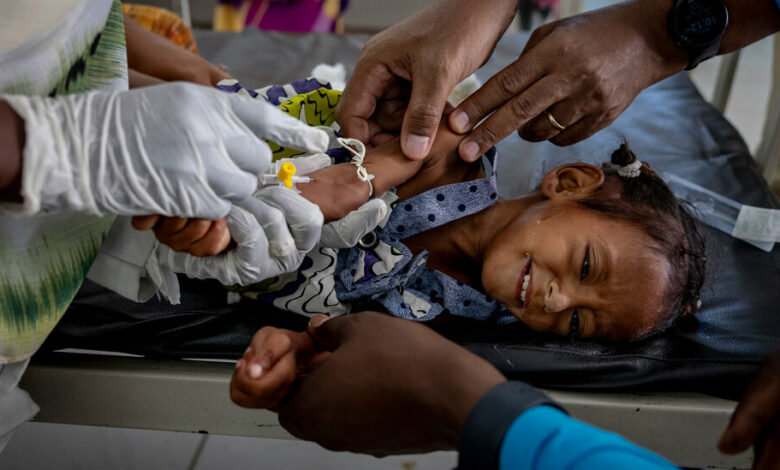At least 750,000 people on the brink of famine and death in Sudan, experts warn

At least 750,000 people are on the brink of hunger and death in Sudan, where a devastating civil war has left more than half of the country’s 48 million people in a situation of chronic hunger, the global authority on famine said Thursday.
At least 14 areas across the country are facing famine, including some in the capital Khartoum, according to the latest figures from the Integrated Food Security Phase Classification, a group of experts from UN agencies and major aid groups that measures hunger and formally declares famine.
The alarming update appears to confirm the warnings of aid experts. According to them, Sudan is heading for a humanitarian disaster on a scale not seen in decades.
“This is possibly the crisis of a generation,” said Edouard Rodier, Europe director of the Norwegian Refugee Council, who was in western Sudan last week. “I have never seen anything like it.”
In a report issued on Thursdaythe group said that 25.6 million Sudanese, or more than half the population, were in a food crisis. Of those, 8.5 million are severely malnourished or struggling to survive, while 755,000 are in a “catastrophe” — effectively famine.
When the group known as the IPC last published estimates for Sudan in decemberthe number of people facing catastrophic food insecurity was zero. The latest figures even surpass those of Gaza, where the group said on Tuesday that 495,000 people were in the same situation.
However, the group has not formally declared famine in Sudan, partly because reliable data is hard to come by. Sudan’s health care system is collapsing and aid workers are unable to reach the worst-affected areas due to heavy fighting and restrictions imposed by warring parties.
Yet few experts doubt that mass death is already underway and that the situation is likely to deteriorate rapidly in the coming months. As early as February, a senior UN official warned the Security Council about this 222,000 Sudanese children could die in the following months.
A more recent study by the Clingendael Institute, a Dutch research group, estimates this up to 2.5 million people could die from hunger-related causes in Sudan in October.
“We may not see a famine declaration, but there is no doubt that the famine crisis has been on an unprecedented scale for 40 years or more and will kill hundreds of thousands of Sudanese,” said Alex de Waal, a famine scholar at the Fletcher School of Law and Diplomacy at Tufts University, told The Horn podcast this week.
Since the outbreak of fighting in April 2023 at least nine million Sudanese have been driven from their homes. The US envoy to Sudan, Tom Perriello, estimates that as many as 150,000 may have been killed, although he adds that accurate figures are impossible to obtain.
The areas where the threat of famine is greatest include the western region of Darfur, where the siege of a major city has sparked fears of a massacre, the capital Khartoum and the country’s breadbasket of Jazeera state, it said IPC.
“This is the single largest humanitarian crisis on the planet,” Samantha Power, the head of USAID, told reporters on June 14.
Ms. Power and other U.S. officials have repeatedly accused the warring sides — Sudan’s national army and a powerful paramilitary group known as the Rapid Support Forces — of using famine as a weapon of war.
Foreign sponsors fueling the fighting have also come under scrutiny, particularly the United Arab Emirates, which backs the Rapid Support Forces, and Iran, which has supplied drones to the military. The Emirates have also donated $100 million in aid to Sudan, a gift it described it as its commitment to a “peaceful solution” from the war.
But despite the scale of the unfolding crisis, the war in Sudan has failed to attract the kind of high-level attention that was given to the crisis in Darfur two decades ago, when Sudan became a major focus of both the White House and celebrities like movie star George Clooney.
The United Nations says they 17 percent of the $2.7 billion the country has requested for Sudan.
“World leaders continue to move forward and express concern about the Sudan crisis,” said Tjada D’Oyen McKenna, head of Mercy Corps, a global aid organization. “Yet they have failed to rise to the occasion.”




